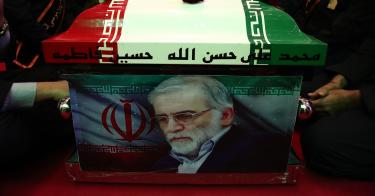There is little consensus about what the killing of Iranian nuclear scientist Mohsen Fakhrizadeh means for the future. Believed to be the supervisor of Iran's nuclear weapons research program, Fakhrizadeh was killed in a barrage of bullets and explosions last week.
A good outcome from the death of a bad man would be to keep American policies headed in the same direction. Unfortunately, many on the left still want to return to the Obama administration’s failed “love the hate out of them” approach to Iran, a terror-sponsoring state that aspires to become a nuclear power.
The conventional wisdom holds that Israel carried out the attack against Fakhrizadeh. That’s understandable, because between 2010 and 2012 four Iranian nuclear scientists were killed in attacks also ascribed to Israel.
Abu Muhammad al-Masri, Al Qaeda’s second-in-command, was gunned down recently on the streets of Tehran—another assassination also widely attributed to Israeli forces.
Israel also recently acknowledged conducting attacks against Iranian positions in Syria.
It is not clear how all these dots connect—at least not publicly. Many people believe the recent acts could be an effort to sour prospects for renewed engagement between Washington and Tehran under a Joe Biden administration.
But not everything that happens is all about the U.S. After all, Tehran has sworn to wipe Israel off the map. Israel has no choice but to view Iran as an existential threat.
This isn’t to say that Washington’s foreign policy wasn’t a factor in the calculations that led to Fakhrizadeh’s death. But the prospects of Washington pivoting to happy days with the Iranian regime were already quite slim. It is easy to campaign on promises to time-travel back to the Iran nuclear deal. It is a lot harder in practice.
For starters, it is worth recalling that former Secretary of State John Kerry—the great architect of the Iran deal when he served in the Obama administration—got everything about the region wrong.
Kerry claimed the Iranian regime would act more responsibly after the nuclear deal. It didn’t. Iran fueled insurgencies, wars and terrorism in Syria, Yemen, Israel and Iraq. The regime remains the world’s most dangerous sponsor of terrorism, accused of plotting at least four major attacks in Europe in recent years.
Kerry claimed that the Iranians would stop pursuing nuclear weapons. They didn’t. Israeli intelligence produced a cache of Iranian classified documents detailing ongoing weapons research. The International Atomic Energy Agency has confirmed that Iran has breached the nuclear deal, enriching uranium to 12 times the allowed limit—clearly building out the underlying infrastructure for a weapons program.
Kerry also famously predicted that, beyond Jordan and Egypt, no other Arab nation would normalize relations with Israel without a Palestinian-Israeli deal. In the last year, with no such deal in sight, three Arab capitals have established relations with Jerusalem.
The left’s policies were all wrong during the Obama years, and they still have no good answers for how to deal with the problems the U.S. faces with Iran now.
How can Washington rejoin the Iran nuclear deal with a straight face and not demand an accounting of the regime’s cheating? Is the U.S. really going to remove sanctions on arms transfers? What about Iran’s appalling human rights record? What about its ballistic missile program? None of these very serious issues can be addressed by rejoining a moribund deal.
Washington also has to consider what the rest of the region would think about the U.S. allowing money and resources to pour into the Tehran regime. Arab nations have been lining up with Israel to oppose Iranian aggression. Wouldn’t they see an about-face by Washington as a sellout?
It is also far from clear what Iran would demand from Washington. Would the Iranians want an apology and reparations for the U.S. killing Gen. Qasem Soleimani, who was caught in Iraq plotting terrorist attacks against American forces? Would any American president really accept all the humiliations Tehran might demand just to reenter a deal that only benefits Tehran and solves none of the region’s real problems?
Let’s be honest. If Israel is poking Iran and that makes it harder for Washington to abandon sensible policies that are constraining the Tehran regime, we should all be thankful for that.
What Washington should keep doing is building a collective security and economic framework that knits the region together, contributes to stability and makes it more resilient against Iranian aggression, Islamist extremism, and malicious Chinese intrusion.
Our current maximum pressure campaign against Iran supports all those goals. The U.S. abandons it at our peril.
This piece originally appeared in Fox News




